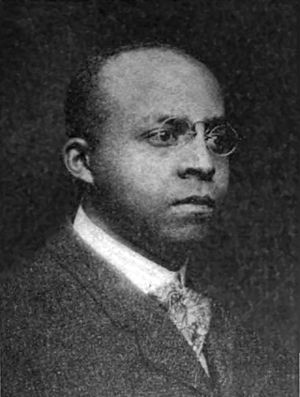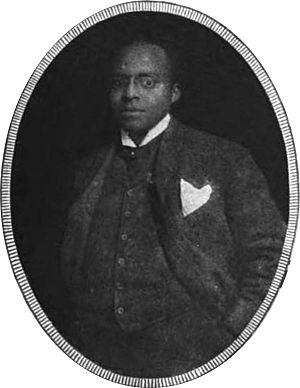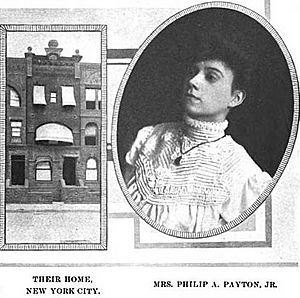Philip A. Payton Jr. facts for kids
Philip Anthony Payton Jr. (February 27, 1876 – August 1917) was an African-American businessman. He was a real estate developer. People called him the "Father of Harlem." This is because he helped many African Americans find homes in Harlem, New York City.
Contents
Early Life and Dreams
Philip A. Payton Jr. was born in Westfield, Massachusetts. This was on February 27, 1876. His father was a barber, and his mother was a hairdresser. His father taught him how to be a barber. By age fifteen, Philip was a skilled barber.
He went to Livingstone College in Salisbury, North Carolina. He graduated from there in 1899. After college, he decided to move to New York City. He wanted to do something more with his life.
In New York, he worked different jobs. He was a department store attendant and a barber. Finally, he became a porter in a real estate office. This job gave him an idea. He realized he wanted to start his own real estate business.
Starting in Real Estate
Payton first learned about real estate as a janitor. He saw how the business worked. He decided to open his own company. In October 1900, he started the Brown and Payton real estate firm.
The business had a tough start. His partner left, and Payton continued alone. His wife helped support them by sewing. There were times when they struggled to pay rent. But Payton kept trying. He believed he would succeed.
He once said, "I knew that if I made one good sale I could make enough to keep me going for a year." Soon, his hard work paid off. He began to manage more houses. He started making good profits.
One big opportunity came from a dispute between two landlords. One landlord wanted to rent his house to Black tenants. Payton helped him fill the house. This success led to more landlords asking for his help. He became known for helping Black families find homes.
The Afro-American Realty Company
On June 15, 1904, Payton started a new company. It was called the Afro-American Realty Company. He worked with other successful Black people. They sold shares in the company for $10 each.
Payton wanted Black people to invest in the company. He told them it was a way to help their community. He said, "The very prejudice that has heretofore worked against us can be turned and used to our profit." This meant they could use unfair treatment to their advantage. They could buy properties and rent them to Black families.
In 1905, a white real estate company tried to stop Black families from moving into Harlem. They bought buildings and evicted Black tenants. They wanted to rent only to white people. Payton's company fought back. They bought nearby buildings. They moved the evicted Black families into these new homes. This event was called a "Real Estate Race War" by The New York Times. Payton's actions helped more Black families find homes in Harlem.
White residents in Harlem were not always happy. They sometimes protested when Black families moved in. But Payton's company kept growing. It bought and leased many properties. This helped Harlem become a center for Black residents.
The Afro-American Realty Company grew to be very valuable. However, some investors had concerns. After a lawsuit, the company stopped operating in 1908.
Building Harlem's Future
Even after the Afro-American Realty Company closed, Payton did not stop. He started a new company. It was called the Philip A. Payton Jr. Company. He continued to buy and manage real estate for Black tenants in Harlem.
By 1914, many Black people in New York City lived in Harlem. Payton was called "the father of his Negro community." His own home on West 131st Street showed his success. In 1900, the street was all white. By 1915, it was almost completely Black.
In July 1917, Payton made his biggest deal. He sold six apartment buildings for about $1.5 million. This was the largest sale of housing for Black people at that time. The buildings were named after important Black figures. These included Crispus Attucks, Toussaint L'Ouverture, and Frederick Douglass. By this time, Harlem's Black population had grown very large.
Philip Payton died a month later in August 1917. He was 41 years old. He died from liver cancer. His company continued his work after his death. It kept managing apartments for African Americans.
His partners, John E. Nail and Henry C. Parker, continued his dream. They helped make Harlem a very important place. It became a political and cultural center for African Americans.
 | Mary Eliza Mahoney |
 | Susie King Taylor |
 | Ida Gray |
 | Eliza Ann Grier |




